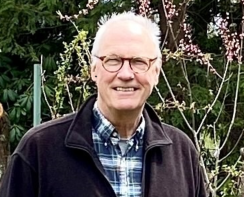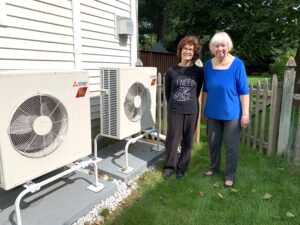 Are you thinking about getting a new heating and/or cooling system, rooftop solar panels or an electric vehicle (EV), but want some informed and impartial information and advice? Are you interested in some of the newer, greener technologies, but don’t understand how they work, what they cost, how much they will reduce emissions, and what the “payback” time will be. If so, then you should take advantage of Green Needham’s “Energy Coaching” program, formerly “Ask the Expert, which provides a valuable service to the community, helping Needham homeowners live more sustainably, saving both money and energy.
Are you thinking about getting a new heating and/or cooling system, rooftop solar panels or an electric vehicle (EV), but want some informed and impartial information and advice? Are you interested in some of the newer, greener technologies, but don’t understand how they work, what they cost, how much they will reduce emissions, and what the “payback” time will be. If so, then you should take advantage of Green Needham’s “Energy Coaching” program, formerly “Ask the Expert, which provides a valuable service to the community, helping Needham homeowners live more sustainably, saving both money and energy.
But who is Green Needham’s “energy coach”? His name is Ed Quinlan, a Needham resident for the past 30 years. Ed worked as a consulting energy engineer for 40 years, where he acquired extensive knowledge and expertise in the design of commercial building HVAC systems and energy efficiency improvements in these buildings. In retirement Ed is using his expertise to advise Needham homeowners who were considering sustainable changes for their homes. Here’s how the “Energy Coaching” program works:
- The homeowner opens Green Needham’s “Energy Coaching” page, enters their contact information, the type of help they need, and a brief description of their home energy project or the electric vehicle (EV) purchase that they are considering.
- After receiving the request, Ed Quinlan contacts the homeowner and requests some basic information about their utilities – how they heat/cool their home, annual utility bills, etc. Once the homeowner sends Ed the requested information, he sets up an appointment with them at their home.
During the appointment, Ed discusses the project specifics with the homeowner:
Electric Vehicles (EVs):
- Good Resource to help with vehicle selection – Green Energy Consumer Alliance’s Drive Green program

- Which vehicles qualify for state and federal rebates?
- How does charging work at home and on the road?
- Will the home’s electric service need to be upgraded and/or will some re-wiring be needed?
- What are the energy costs and the emissions impact?
Rooftop Solar:
- Is the site good for solar – shading, size and roof orientation?
- What are the estimated construction costs, state and federal rebates, utility bill savings, and carbon emissions impact?
- How do I find a contractor to do the work?
Existing Homes:
- How does the heat pump technology work and how will it affect their home?
- Homes with ductwork: is the existing ductwork in good condition and is it zoned properly for heating?
- Homes With No ductwork: where would the indoor units be placed, and how would the installer get power and piping to those locations?
- What energy efficiency and weatherization work should be done first?
- How will it affect the home’s energy costs?
- Does the house have adequate power, or would the electric service need to be upgraded?
- What are the different thermostat control options that support easy ways to regulate the system?
- What are the construction costs, state and federal rebates, energy costs, and carbon emissions?
- How do I find a contractor to do the work?
New Construction:
- Construction costs for heat pumps are the same as that of conventional heating systems. Also, new construction makes geothermal more cost effective.
Solar Hot Water:
- Ed doesn’t recommend these – instead he advises homeowners to get (rooftop) solar PV and a heat pump water heater.
What’s been the feedback from the homeowners about the program? Very positive – homeowners feel more confident about moving forward with their project after getting impartial, informed advice, as well as cost and payback calculations specific to their project. This is particularly true of heat pumps, where the technology is still somewhat unfamiliar to the average person. In his retirement, Ed has found a way to use his knowledge and experience to support sustainable living in his community – he has advised over 90 homeowners, donating many hours of his time to the program. One important tip from Ed: homeowners need to anticipate when their heating or cooling system will need to be replaced, so that they have the time to evaluate their options. Otherwise, if they wait until it fails, they won’t have time to do this. The expected life of major heating/cooling items is: Furnaces – 15-20 years Boilers – 20-25 years AC – 15-20 years Hot Water Tanks – 10 years
So, don’t wait! If you are or should be considering a home energy upgrade in the near future, contact Green Needham’s Energy Coach now – you’ll be glad you did!


